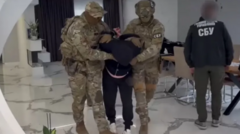While their public displays of friendship are apparent, deeper complexities underline their partnership as China navigates its position in the world.
Xi and Putin: A Diplomatic Dance Amidst Global Tensions

Xi and Putin: A Diplomatic Dance Amidst Global Tensions
As tensions with the West continue, the intricate relationship between Xi Jinping and Vladimir Putin is under scrutiny.
In a highly publicized event in Moscow, Chinese President Xi Jinping stood beside his Russian counterpart, Vladimir Putin, reinforcing their countries' alliance during the Victory Day parade. This marked Xi's 11th visit to Russia since he assumed the presidency in 2013 and added to their tally of over 40 meetings. The two leaders' camaraderie was on full display, with Xi describing their relationship as “unbreakable” and declaring the need for Russia and China to be “friends of steel.”
Despite the optics of a robust alliance, experts caution that the friendship is not as straightforward as it appears. Mathieu Boulegue from the Center for European Policy Analysis observes that while Xi and Putin share public affection, they also embody a competitive dynamic that complicates their relationship. The symbolic gestures are compelling, but the underlying reality may be more contentious, with each leader eyeing their national interests closely.
China relies on Russia as a crucial ally, yet President Putin’s isolation due to the invasion of Ukraine complicates the partnership. Xi must balance this relationship carefully, mindful of potential backlash as Beijing seeks to strengthen ties with Europe while simultaneously supporting a pariah state. Recent communications between Xi and leaders of the European Commission underscore China's effort to position itself as a stable global partner, especially contrasting the unpredictable political climate in the United States.
However, Xi's alignment with Russia could hinder potential partnerships with European nations that are cautious about China's support for the Kremlin. Furthermore, President Xi has directed pointed messages toward the US, asserting the resilience of Sino-Russian bonds and dismissing attempts to disrupt their relationship. The duo denounced US missile defense plans as destabilizing, advocating for a shared vision against American dominance.
Analyzing China's global standing reveals a shift in power dynamics; while China has emerged as a superpower, the ongoing war in Ukraine has diminished Russia's global influence. Analysts suggest that the Kremlin's dependency on China has significantly increased due to Western sanctions impacting Russia's economy and military capabilities. In this intricate dance of diplomacy, Xi Jinping cautiously navigates the complexities of international relations, recognizing that while a close alliance with Putin carries strategic weight, it also poses substantial risks for China's global ambitions.
As Xi and Putin forge ahead, the path they tread together is fraught with potential discord, raising questions about the sustainability of their friendship amidst shifting geopolitical landscapes.
Despite the optics of a robust alliance, experts caution that the friendship is not as straightforward as it appears. Mathieu Boulegue from the Center for European Policy Analysis observes that while Xi and Putin share public affection, they also embody a competitive dynamic that complicates their relationship. The symbolic gestures are compelling, but the underlying reality may be more contentious, with each leader eyeing their national interests closely.
China relies on Russia as a crucial ally, yet President Putin’s isolation due to the invasion of Ukraine complicates the partnership. Xi must balance this relationship carefully, mindful of potential backlash as Beijing seeks to strengthen ties with Europe while simultaneously supporting a pariah state. Recent communications between Xi and leaders of the European Commission underscore China's effort to position itself as a stable global partner, especially contrasting the unpredictable political climate in the United States.
However, Xi's alignment with Russia could hinder potential partnerships with European nations that are cautious about China's support for the Kremlin. Furthermore, President Xi has directed pointed messages toward the US, asserting the resilience of Sino-Russian bonds and dismissing attempts to disrupt their relationship. The duo denounced US missile defense plans as destabilizing, advocating for a shared vision against American dominance.
Analyzing China's global standing reveals a shift in power dynamics; while China has emerged as a superpower, the ongoing war in Ukraine has diminished Russia's global influence. Analysts suggest that the Kremlin's dependency on China has significantly increased due to Western sanctions impacting Russia's economy and military capabilities. In this intricate dance of diplomacy, Xi Jinping cautiously navigates the complexities of international relations, recognizing that while a close alliance with Putin carries strategic weight, it also poses substantial risks for China's global ambitions.
As Xi and Putin forge ahead, the path they tread together is fraught with potential discord, raising questions about the sustainability of their friendship amidst shifting geopolitical landscapes.





















